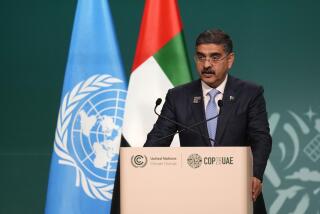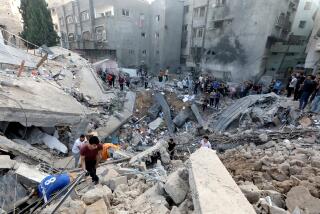Church Attack in Pakistan Kills Two Americans
- Share via
ISLAMABAD, Pakistan — An unidentified attacker rushed into the Protestant International Church here Sunday and hurled several grenades, killing five people, including two Americans, and leaving more than 40 people injured.
It was the second assault on a Christian church in Pakistan since the Sept. 11 terrorist attacks in the United States.
Killed in Sunday’s attack, which occurred shortly before 11 a.m., were a U.S. Embassy personnel official, Barbara Green, and her daughter, Kristen Wormsley, 17, a high school senior. Green’s husband, Milton, who works in the embassy’s information management department, was hospitalized along with the couple’s son, Zack, a fifth-grader, whose age was not released but whose injuries were described as minor.
The other fatalities included an Afghan, a Pakistani and a person of unknown nationality, who Pakistani security officials said had been “blown to pieces.” Sources close to the investigation of the bold attack at the church frequented by Americans and other foreign diplomatic families said they were looking into whether the unidentified dead person might have been the attacker and whether he was assisted by others.
President Bush denounced the killings, saying they “cannot be tolerated.”
“I am outraged by the terrorist attack that took place today in Islamabad, Pakistan, against innocent civilians,” he said in a statement issued Sunday morning by the White House.
Bush, who was at Camp David, Md., added: “We will work closely with the government of Pakistan to ensure those responsible for this terrorist attack face justice.”
Western officials seemed split on whether the unidentified victim was a member of the congregation or a perpetrator. The remains, described as “a head and two legs” by investigating officials leaving the mortuary where they were taken, might be of an African or a Pakistani “of very dark complexion,” sources said.
Local hospitals and the U.S. Embassy said that at least 13 Americans were among those wounded in the attack. The strong percussions of the grenades, which one witness said might have been homemade, left blood on the floor, walls and ceiling of the sparse church, where portable chairs were scattered and long white curtains left dangling through shattered windows.
The church is less than a mile from the U.S. Embassy in the Pakistani capital, in a heavily guarded diplomatic enclave that is protected by guards and road barriers. Sunday services there have drawn a regular crowd of about 60 people.
Officials were quick to point to Muslim extremists as culprits in the attack, hinting that they had hurled the explosives in response to President Pervez Musharraf’s recent crackdown on fundamentalist groups and his alliance with the United States in the war on terrorism.
The blasts came a little more than two weeks after U.S. forces began their largest ground assault on Al Qaeda hide-outs in Afghanistan and amid rising threats and attacks on U.S. citizens in the region, including the abduction and execution of Wall Street Journal reporter Daniel Pearl in Pakistan and a drive-by shooting in front of the American Center in Calcutta in January.
On Saturday, the embassy here issued a warning to Americans living and working in the area of the port city of Karachi, about 700 miles to the south, sparked by what one official called “generalized threats.”
“There is a hard lesson to be drawn from this,” Wendy Chamberlin, U.S. ambassador to Pakistan, said after the attack.
“President Bush and President Musharraf and other courageous leaders were absolutely right to take on the terrorists, no matter where they are, to say, ‘No more.’ We will not give in to those who hate. These terrorists will not win in the United States, and they will not win in Pakistan,” Chamberlin said.
But as of 3 p.m. Sunday in Islamabad, investigators said they did not have a clear idea of who the assailant might be. There had been no claim of responsibility, they said.
The attack came in the middle of the pastor’s sermon on a warm Sunday morning. Some of the worshipers, many of them aid workers and teachers, said they had been evacuated from Pakistan right after the Sept. 11 attacks and had returned just weeks ago to what had been judged a safer environment than it was in the fall.
How the attacker evaded the heightened security of the diplomatic enclave was not clear, but one theory being investigated by Pakistani police was that at least one assailant arrived by bicycle, using the small paths that crisscross the “jungle area” around the compound.
Western officials said the church had little security. One official said that the security measures it did have were “easy to penetrate and relatively porous.”
Jeff Womble, 40, of Brandon, Fla., was sitting three rows from the back of the church, which was divided into three seating sections, when a man he described as in his early 20s rushed in from the right rear side with two grenades in each hand and hurled them toward the middle section. At least two exploded.
“I’m not sure he knew what he was doing,” said Womble, who said he works for a nongovernmental group whose name he did not wish to reveal. Womble, who said his ears were still ringing from the blasts, suffered facial cuts and shrapnel wounds in the legs. He said the attack came in the middle of a sermon on “forgiveness and restoration,” and he then smiled ironically from his bed in the emergency room of Shifa International Hospital.
“I grabbed my wife and my 6 1/2-year-old son, who was sitting between us, and we hit the floor, and I covered her with my body,” he said. “The grenade landed seven rows up, and there was a big explosion. My first thought was that maybe I had died. But I was all right. Then I checked my wife, and she was hurt. But I couldn’t find my son. He had been sitting crying in between us, and he had been blown two rows back. I got him and laid him next to his mother. He had shrapnel wounds to the head. I didn’t know whether he’d been shot, but he was conscious.”
Both wife and son were hospitalized and were awaiting surgery.
Kate Mitchell, 42, a British citizen who teaches at the American School in Islamabad, said she was sitting toward the left front of the church when she heard “small noises like firecrackers” coming from the rear. She saw people standing up, then heard some explosions.
“I unconsciously reached for my little boy,” she said from her hospital bed. “I saw some grenades sliding across the floor to our side of the church, and suddenly I felt searing pain and my lung collapsed. When I looked over, my husband had a hunk of meat on his back.”
But she described an even harsher drama playing out before her. Sitting nearby, she said, were the Greens, whose son was in her fifth-grade class. He was distraught watching his sister and mother bleeding beside him, Mitchell said.
“I was saying, ‘Zack, it’s OK.’ But I was covered in blood, so I don’t know how much comfort I offered. I was trying to get my fourth-grade son to comfort him. I didn’t realize it was his sister who was dying,” she said.
Finally, she said, the girl was carried out of the church by her severely wounded father. The Greens were evacuated to the Polyclinic hospital, where U.S. security personnel from the embassy guarded them.
“Neither the mother or the daughter died immediately,” said an official who knew them. “They lingered.”
Reaction to the attack came quickly within Pakistan, with Musharraf condemning it as a “ghastly act of terrorism.” The government formed a special committee to investigate, with the military taking the lead, said Pakistani security officials who asked not to be identified.
On Sunday afternoon, Interior Minister Moinuddin Haider, who had been in Karachi, arrived in Islamabad to visit some of those wounded in the attack.
The first patients he visited at Shifa hospital were Denis Sherbeck, 43, and his wife, Christina, 38, who described themselves as Christian missionaries from the Chicago area. They had been wounded by shrapnel from the grenades.
Denis Sherbeck had led the singing and the prayers during the service, and it was he who had picked the theme of “forgiveness and restoration,” choosing Psalm 103, to focus on God’s mercy and forgiveness, he said.
“And we do forgive them,” he told a reporter after the Pakistani official left his room. “Like Jesus hanging on the cross said, ‘Forgive them, for they don’t know what they’re doing.’ And they really don’t know what they’re doing.”
*
Times staff writers Edwin Chen in Washington and Rone Tempest in Kabul, Afghanistan, and special correspondent Talat Hussain in Islamabad contributed to this report.
More to Read
Sign up for Essential California
The most important California stories and recommendations in your inbox every morning.
You may occasionally receive promotional content from the Los Angeles Times.














